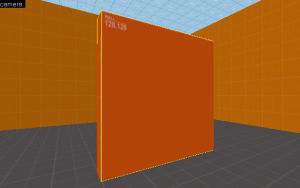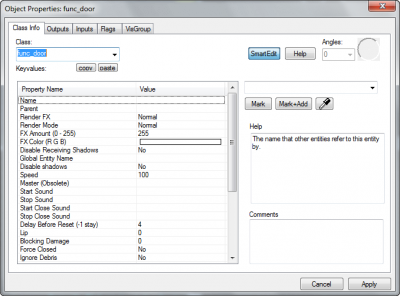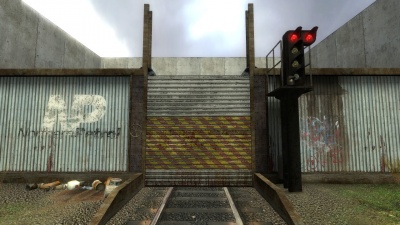Pt-br/Creating Brush Entities: Difference between revisions
No edit summary |
No edit summary |
||
| Line 19: | Line 19: | ||
Agora você deve conseguir compilar o mapa e ver a porta funcionando. | Agora você deve conseguir compilar o mapa e ver a porta funcionando. | ||
== | == Terminando == | ||
Abra o [[Hammer Texture Browser|Texture Browser]] e [[Hammer Texture Browser#Filter|filtro]] para “porta”. Escolha um material que você goste e aplique-o ao brush como faria normalmente. Talvez você também queira construir uma parede que conecte a porta às bordas do mapa. | |||
[[File:Decorated door.jpg|400px|thumb|none| | [[File:Decorated door.jpg|400px|thumb|none|Mas não se empolgue muito!]] | ||
== | ==Destruindo== | ||
Para transformar uma entidade de pincel em uma entidade normal, selecione-a e pressione {{key|Ctrl+Shift+W}}, ou '''ToWorld'''', ao lado do botão ToEntity que você clicou anteriormente. | |||
{{Navbar | {{Navbar | ||
Revision as of 12:05, 9 September 2024
This page either contains information that is only partially or incorrectly translated, or there isn't a translation yet.
If this page cannot be translated for some reason, or is left untranslated for an extended period of time after this notice is posted, the page should be requested to be deleted.
Also, please make sure the article complies with the alternate languages guide.
As a courtesy, please do not edit this while this message is displayed.
If this page has not been edited for at least several hours to a few days, please remove this template. This message is intended to help reduce edit conflicts; please remove it between editing sessions to allow others to edit the page.
The person who added this notice will be listed in its edit history should you wish to contact them.
Já criamos brushes. Há um outro lado deles: as entidades de brush
Neste exemplo, criaremos um brush que funciona como uma porta deslizante. Quando o jogador tocar o brush, ele se elevará no ar e permitirá a passagem.

Construção
- Selecione o bloco Block tool
 e crie um novo brush. 128×128×16 é um bom tamanho, mas qualquer tamanho serve.
e crie um novo brush. 128×128×16 é um bom tamanho, mas qualquer tamanho serve.  Dica:Se a grade do Hammer for muito grande para ser reduzida a 16 unidades, pressione [ ou clique em Smaller Grid'
Dica:Se a grade do Hammer for muito grande para ser reduzida a 16 unidades, pressione [ ou clique em Smaller Grid'  para reduzi-la. Nunca desative o encaixe a menos que você realmente precise!
para reduzi-la. Nunca desative o encaixe a menos que você realmente precise! - Mova o brush para uma entidade (também conhecido como “amarrar” a uma entidade) usando Ctrl+T ou o botão toEntity:

 Dica:Se você tiver desmarcado o brush ao qual deseja vincular a entidade, será necessário selecionar novamente, caso contrário, o botão toEntity não funcionará quando você clicar nele
Dica:Se você tiver desmarcado o brush ao qual deseja vincular a entidade, será necessário selecionar novamente, caso contrário, o botão toEntity não funcionará quando você clicar nele - Isso abrirá a caixa de diálogo Propiedades do Objeto:
 Dica:Se você precisar acessar a caixa de diálogo novamente mais tarde, selecione o brush e pressione Alt+Enter.
Dica:Se você precisar acessar a caixa de diálogo novamente mais tarde, selecione o brush e pressione Alt+Enter. - Select func_door from the “Class” drop-down menu in the top left (you can search by typing into the box) and hit “Apply”.
- Near the bottom of the main “Keyvalues” list, find “Move Direction”. Either change its value to read “
-90 0 0” or select “Up” from the drop-down list to the left of the black circle. - Click “Apply” again, then close the Object Properties dialog.
Agora você deve conseguir compilar o mapa e ver a porta funcionando.
Terminando
Abra o Texture Browser e filtro para “porta”. Escolha um material que você goste e aplique-o ao brush como faria normalmente. Talvez você também queira construir uma parede que conecte a porta às bordas do mapa.
Destruindo
Para transformar uma entidade de pincel em uma entidade normal, selecione-a e pressione Ctrl+Shift+W, ou ToWorld', ao lado do botão ToEntity que você clicou anteriormente.

